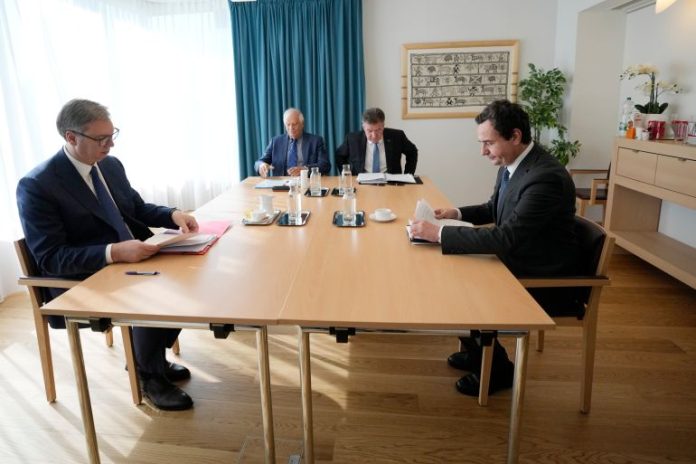The hostility between Serbia and its former region of Kosovo has not subsided for decades. Kosovo declared independence in 2008, which Belgrade refused to recognise, according to TRT World.
Kosovo’s prime minister has accused the European Union special envoy in the normalisation talks with Serbia of not being “neutral and correct” and “coordinating” with Belgrade against Pristina.
According to Prime Minister Albin Kurti, EU envoy Miroslav Lajcak has agreed with Serbian President Aleksandar Vucic on the course of the EU-facilitated talks held in Brussels last week.
EU foreign policy chief Josep Borrell, who oversaw the talks in Brussels, blamed the latest breakdown in talks on Kurti’s insistence that Serbia must essentially recognise his country before progress can be made on enforcing a previous agreement reached in February.
Borrell said the lack of progress could delay Serbia and Kosovo’s entry into the bloc.
Serbia and its former region of Kosovo have been feuding for decades. The 1998-1999 hostilities, following 78 days of NATO bombing and the withdrawal of Serbian military and police from Kosovo, left more than 10,000 people dead, mostly Kosovo Albanians. Kosovo declared independence in 2008, which Belgrade refused to recognise.
On Monday, Kurti said Kosovo had offered a step-by-step proposal for the implementation of the agreement reached in February. Serbia has never offered any proposal while Lajcak brought out an old Serbian document they had turned down earlier. In February, the EU proposed a 10-point plan aimed at ending the months-long political crisis. Kurti and Vucic gave their approval at the time, but with some reservations that have still not been resolved. Kurti said at a news conference:
“These are divergent negotiations due to the asymmetry from the mediator, who is not neutral. We do not need such a unilateral envoy, not neutral and correct at all, who runs counter to the basic agreement, which is what is happening with the envoy, Lajcak.”
Kurti also criticised Borrell and Lajcak as EU representatives for not responding to Serbia’s continued violation of the February agreement with statements against Kosovo. It was time for consultations with Brussels, Washington and other main players to bring “the train (i.e. talks) back to the rails,” he said. Kurti added:
“We should return to the basic agreement, how to apply it. Serbia’s violation has been encouraged and not punished as the agreement states.”
In August, senior U.S. lawmakers warned that negotiators were not putting enough pressure on the Serbian leader. In their view, the West’s current approach shows a “lack of objectivity”.
In May, Serbs clashed with security forces, including NATO-led KFOR peacekeepers, during a dispute over the legality of local elections in northern Kosovo, which is dominated by the Serb minority, injuring 93 soldiers.
